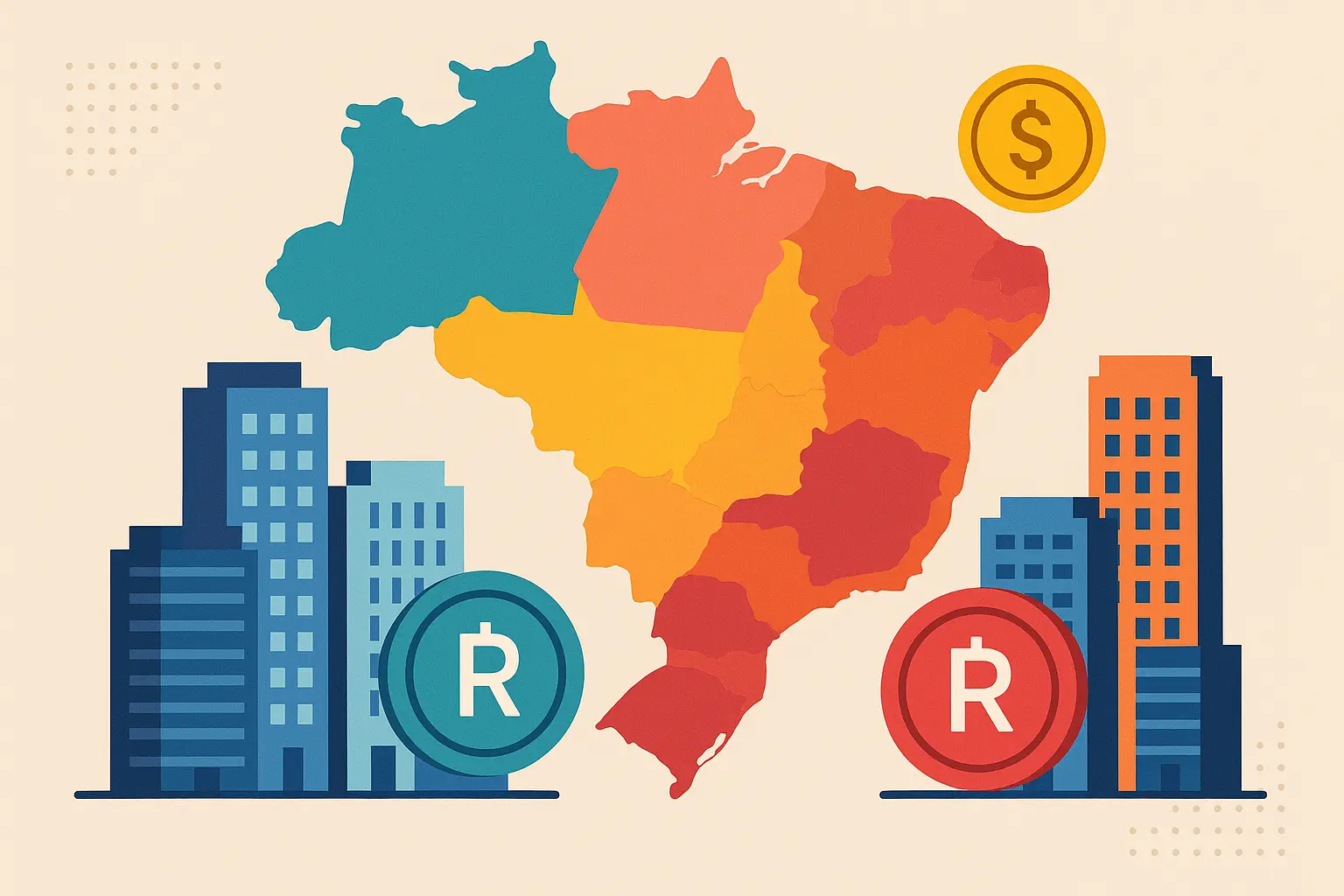After months of digging into Brazilian salary data for my own career move, I discovered something shocking: that “average salary” number everyone quotes? It’s basically useless.
According to recent industry data, the average annual salary in Brazil is approximately BRL 40,200 (around USD 7,025.63 per year) as of 2025, but this figure hides massive variations that could make or break your financial future. Brazil’s salary landscape is like a crazy patchwork quilt. A software engineer in São Paulo makes R$10,000+ monthly while someone doing the same job in a smaller city might earn R$4,000. The regional gaps are insane, the benefits system is unlike anywhere else, and the education premium will blow your mind.
Here’s everything I wish someone had told me before I started this research journey.
Table of Contents
-
Why Most Salary Data Is Garbage
-
The Regional Pay Gaps Are Insane
-
Industry Reality Check: The Good, Bad, and Ugly
-
Education = Money (Like, Seriously)
-
Where to Actually Find Good Salary Data
-
Economic Forces Messing With Your Money
-
My Research Strategy That Actually Works
-
Brazilian Salary Negotiations: What Actually Works
-
Brazil’s Weird Pay Structure
-
Documentation That Opens Doors
-
The Real Talk
TL;DR
-
São Paulo and Rio salaries can be 30-50% higher than interior cities, but living costs eat into that premium
-
Tech, finance, and oil & gas professionals earn the most (often R$10,000+ monthly), while service workers typically make minimum wage
-
University graduates earn 2-3 times more than high school graduates – the education premium is massive
-
Government data (IBGE) provides the most reliable baseline, but job sites give you current market rates
-
Brazil’s 13th salary and complex benefits system mean you need to calculate total annual compensation, not just monthly wages
-
Inflation constantly erodes purchasing power, so focus on real wage growth, not just nominal increases
-
Timing salary negotiations around company budget cycles and building relationships first improves success rates
Why Most Salary Data Is Garbage
When I googled “average salary Brazil,” I got numbers ranging from R$3,500 to R$8,000 for the same year. What gives?
Turns out, most surveys are biased. Some only count big corporations with formal contracts. Others include freelancers and small business employees. Government data is solid but outdated. Job sites show inflated numbers because they focus on higher-skilled positions.
The result? You could make terrible career decisions based on bad data.
My reality check: I found marketing coordinator salaries listed at R$7,500 in São Paulo and R$3,200 in northeastern cities. Both are “average” – but neither helps you plan your life.
The Sampling Problem
Most salary surveys suffer from serious sampling bias. They focus heavily on formal sector employees while ignoring Brazil’s massive informal economy. This creates an artificially inflated view of wages since informal workers typically earn less but represent a huge chunk of the workforce.
I discovered this when comparing different salary reports – some showed average monthly wages of R$6,000, while others reported R$3,500 for similar positions. The difference? One survey only included employees at large corporations with formal contracts, while the other captured freelancers and small business employees.
National Averages Are Useless
Using national salary averages for career planning in Brazil is like using a weather forecast for the entire country – completely meaningless for your specific situation. The differences between regions are so dramatic that national figures become useless for practical decisions.
The Regional Pay Gaps Are Insane
São Paulo doesn’t just pay more – it pays 40-60% more for identical jobs. But here’s the kicker: your rent might eat up that entire premium.
I mapped out salaries across Brazil and the inequality is staggering:
-
São Paulo: R$8,560 average, but 40% goes to housing
-
Rio: R$7,800 average, slightly better cost ratio
-
Salvador: R$5,400 average, much cheaper living
-
Interior cities: R$3,200 average, but your money goes further
Real talk: My friend Maria moved from Recife to São Paulo. Her salary jumped from R$4,500 to R$8,000, but after rent and expenses, she only gained 15% in actual purchasing power.
The Metropolitan Premium Breakdown
Major metropolitan areas command salary premiums of 30-50% over interior cities, but this advantage gets complicated when you factor in housing costs, transportation expenses, and quality of life considerations.
|
City |
Average Monthly Salary (BRL) |
Cost of Living Index |
Real Purchasing Power |
|---|---|---|---|
|
São Paulo |
8,560 |
100 |
85.6 |
|
Rio de Janeiro |
7,800 |
95 |
82.1 |
|
Brasília |
7,200 |
88 |
81.8 |
|
Salvador |
5,400 |
70 |
77.1 |
|
Recife |
4,800 |
65 |
73.8 |
|
Interior Cities |
3,200 |
55 |
58.2 |
North vs South Economic Reality
The south has all the industrial jobs with real career ladders. The north? Mostly agriculture and basic services with limited growth potential.
The manufacturing sector in states like São Paulo and Rio Grande do Sul offers career ladders that simply don’t exist in regions where agriculture and basic services dominate. I found this particularly evident when researching engineering positions – the south had dozens of specialized roles while northern states offered mainly general engineering positions with limited growth potential.
Industry Reality Check: The Good, Bad, and Ugly
Your industry choice basically determines your financial future in Brazil. The differences are staggering.
The Winners (R$10,000+ Monthly)
Tech: Brazil’s technology sector is experiencing explosive salary growth. According to recent industry analysis, “Brazil’s tech industry is booming as we approach 2025, with average tech salaries hitting BRL 180,000 annually, far surpassing the national average” from Nucamp. AI architects earn R$400,000-550,000 annually, while Software Engineers in São Paulo see base salaries between BRL 8,000 to 9,000 monthly at major companies like Amazon.
For professionals looking to transition into Brazil’s booming tech sector, having proper educational credentials becomes crucial for landing these high-paying positions.
Finance: Banking pays well but demands certifications and brutal hours. The financial sector consistently pays above-average wages, but entry requirements are steep.
Oil & Gas: Great money, limited locations.
The Middle Class (R$3,000-6,000)
Manufacturing: Steady work, good unions, predictable raises. Manufacturing jobs offer something many other sectors don’t: predictable career progression and strong union representation that helps protect wages and benefits.
Healthcare: Decent money, especially specialists.
The Struggle (Minimum Wage Territory)
Service/Retail: Most earn R$1,518-2,500 monthly. Brazil’s minimum wage as of 2025 is R$1,518.00 per month, reflecting a 7.5% increase from the previous year according to Playroll.
Hospitality: Seasonal income, unpredictable tips. Working in hospitality can be particularly challenging because your income fluctuates with tourism seasons and economic conditions.
|
Industry Sector |
Entry Level (BRL/month) |
Mid-Level (BRL/month) |
Senior Level (BRL/month) |
Growth Potential |
|---|---|---|---|---|
|
Technology |
8,000 |
15,000 |
25,000+ |
High |
|
Finance/Banking |
6,000 |
12,000 |
20,000+ |
High |
|
Manufacturing |
3,000 |
5,500 |
8,500 |
Medium |
|
Healthcare |
4,500 |
8,000 |
15,000 |
Medium-High |
|
Education |
2,800 |
4,500 |
7,000 |
Low-Medium |
|
Retail/Service |
1,518 |
2,200 |
3,500 |
Low |
Education = Money (Like, Seriously)
University graduates earn 2-3 times more than high school graduates. It’s not even close. The educational premium in Brazil is absolutely massive and compounds over your entire career.
According to salary research data, “employees with a Bachelor’s degree earn 24% income more than diploma degree holders, while employees with a Master’s degree earn 29% more income than those with a Bachelor’s degree” from TimeDoctor.
The University Premium Breakdown
Medical/Engineering degrees: Starting salaries 200-300% above national average. Medical professionals, particularly specialists, can earn R$15,000-30,000 monthly even outside major cities.
MBA/Finance: Opens doors to multinational companies and Brazil’s growing financial technology sector.
Alternative Paths That Work
Tech certifications: Faster path than formal degrees. While university degrees provide the highest salary premiums, technical certifications in areas like IT can offer faster paths to middle-class wages.
Understanding the types of degrees that command the highest premiums in Brazil’s job market can help professionals make strategic educational investments.
Success story: João skipped university for a 6-month coding bootcamp. Eighteen months later, he’s earning R$6,500 monthly – way above average and achieved in a fraction of the time.
For those considering alternative paths, understanding certificates vs diplomas can help determine the most cost-effective route to higher earnings.
Where to Actually Find Good Salary Data
Most people Google “Brazilian salaries” and call it research. That’s like using a broken compass – you’ll end up lost.
Start here:
-
IBGE (government stats) – Most reliable baseline, but 3-6 months behind
-
Job sites (Catho, InfoJobs) – Current market rates, but skewed upward
-
Professional networks – Real people, real numbers
Government Sources: Your Foundation
IBGE conducts quarterly household surveys that track income trends across demographics and regions. I always start my research here because their methodology is transparent and consistent, even if the numbers are a few months behind current market conditions.
Labor ministry data offers detailed breakdowns by industry and formal employment categories, though it misses the informal economy that represents a significant portion of Brazilian workers.
Private Sector Intelligence
Major job sites aggregate salary postings to provide market insights, but you need to account for posting bias toward higher-paying positions and urban markets.
I spend hours scrolling through job postings to get a feel for what companies are actually offering. The trick is looking at dozens of similar positions to identify patterns rather than getting excited about one outlier posting.
My process: I cross-reference all three sources. For marketing manager roles in Rio, IBGE showed R$5,200, job sites posted R$6,500-8,500, and my contacts reported R$7,200 actual offers. I targeted R$7,500 in negotiations – right in the sweet spot.
Economic Forces Messing With Your Money
Brazil’s economy
Brazil’s economy loves to throw curveballs at your salary. Inflation is the big villain here – it quietly eats your purchasing power while you’re not looking.
Reality check: I got excited about a 10% raise once, then realized inflation hit 12% that year. My buying power actually went down despite the “increase.”
Inflation: The Silent Salary Killer
Brazil’s history of inflation significantly impacts real wages. While nominal wages may increase annually, inflation often erodes purchasing power faster than salary growth.
Market Dynamics That Matter
What’s really affecting your wages:
-
Inflation: Makes your money worth less over time
-
Currency swings: If you work for international companies, the Real’s ups and downs matter
-
Skills shortages: Tech professionals can demand crazy salaries because there aren’t enough of them
-
Formal vs informal economy: Tons of Brazilians work “off the books,” which skews all the official numbers
Pro tip: Always think in real wages (adjusted for inflation), not just the number on your paycheck.
My Research Strategy That Actually Works
Here’s my step-by-step process:
-
Start with IBGE data – Government baseline, even if it’s a few months old
-
Hit the job sites – Catho, InfoJobs, LinkedIn for current postings
-
Network like crazy – Talk to 5-10 people actually doing the job you want
-
Test the market – Apply to positions just to see what they offer
-
Factor in location – Adjust everything for where you actually want to live
Multi-Source Validation
Cross-referencing government statistics with private surveys and job postings helps validate salary ranges while accounting for regional variations and industry-specific factors.
Market testing example: When researching marketing roles in Rio, I applied to three positions I wasn’t even interested in. The salary discussions gave me real data that beat any survey.
My research checklist:
-
Government stats ✓
-
Job posting ranges ✓
-
Professional network insights ✓
-
Regional cost adjustments ✓
-
Total compensation calculations ✓
-
Market validation through applications ✓
When researching marketing manager salaries in Rio de Janeiro, I found IBGE data showing R$5,200 monthly average, job sites posting R$6,500-8,500 ranges, and networking contacts reporting R$7,200 actual offers. This triangulation helped me target R$7,500 in negotiations – right in the validated sweet spot.
Brazilian Salary Negotiations: What Actually Works
Forget aggressive American-style negotiations. Brazil is all about relationships and timing.
Brazilian workplace culture emphasizes personal relationships and respect for hierarchy, making salary negotiations more effective when conducted through proper channels with adequate preparation and cultural sensitivity.
What works:
-
Build relationships first, negotiate later
-
Time requests with company budget cycles (October-November)
-
Present market data professionally
-
Show measurable value, not just demands
Cultural tip: Schedule formal meetings for salary discussions. Casual hallway conversations rarely work here.
Timing and Market Awareness
Brazilian companies typically conduct salary reviews during specific periods aligned with fiscal calendars. Most Brazilian companies set budgets in November and December for the following year. Approaching your manager in October with a well-researched salary proposal gives them time to include your increase in next year’s planning.
Relationship Building Strategy
Successful salary negotiations in Brazil typically require establishing trust and demonstrating value over time rather than aggressive immediate demands, with timing and approach being as important as the actual salary request.
Effective negotiation steps:
-
Research company-specific salary bands through employee networks
-
Schedule formal meetings rather than casual salary discussions
-
Present market data professionally with regional comparisons
-
Emphasize measurable value contribution and achievements
-
Allow relationship-building time before pressing for decisions
Brazil’s Weird Pay Structure
Brazil has mandatory benefits that add 30-40% to your total compensation:
-
13th salary: Extra month’s wages annually
-
Benefits: Health insurance, meal vouchers, transportation allowances
-
Taxes: Can hit 25-30% for middle-class earners
Key insight: Always calculate total annual compensation, not just monthly wages. That R$6,000 monthly job might actually be worth R$9,000 when you include everything.
The 13th Salary System
Brazil’s mandatory 13th salary payment effectively provides an additional month’s wages annually, but this benefit gets complicated by tax implications and timing that affect cash flow and total compensation calculations.
Benefits Package Integration
Brazilian benefits packages often include health insurance, meal vouchers, transportation allowances, and other perks that can add 20-40% to base salary value, making total compensation analysis essential for accurate comparisons.
When evaluating total compensation packages, professionals should consider how benefits compare to simply getting a college degree elsewhere, as Brazilian packages can significantly boost real value.
Tax Reality Check
Brazilian tax brackets and social security contributions substantially reduce gross salaries, with effective tax rates that can reach 25-30% for middle-class earners, making net income calculations crucial for budgeting and career decisions.
Key calculation factors:
-
Calculate total annual compensation including 13th salary and benefits
-
Factor in progressive income tax brackets for different salary levels
-
Account for INSS social security contributions (up to ceiling limits)
-
Compare total compensation packages rather than just base salaries
-
Understand regional tax variations that might affect net income
Documentation That Opens Doors
Here’s something most people miss: having your educational credentials properly documented and accessible can make or break high-paying opportunities in Brazil.
Brazilian employers are obsessed with educational verification. Lost your diploma? Need certified copies for visa applications? Don’t let paperwork kill your salary potential.
Having the right documentation ready becomes crucial when you’re pursuing these higher-paying opportunities in Brazil’s competitive job market. ValidGrad can help ensure you have backup copies of your educational credentials readily available for employment verification, visa applications, or career transitions. With Brazil’s emphasis on educational credentials in determining salary levels, having secure backup copies of your diplomas and transcripts through ValidGrad’s services can be invaluable for career advancement and salary negotiations.
For professionals who need to replace a lost diploma or obtain replacement diplomas for Brazilian employment verification, having proper documentation can make the difference in securing higher-paying positions.
Whether you’re considering online degrees or traditional education paths, understanding how different credentials impact earning potential in Brazil’s job market is crucial for making informed career decisions.
The credential reality: Brazil’s emphasis on education means proper documentation isn’t just helpful – it’s essential for accessing those higher salary brackets we talked about.
The Real Talk
After months of research, here’s what matters most:
My biggest takeaways:
-
Location is everything – São Paulo pays more but costs more. Do the math on real purchasing power.
-
Education pays off massively – The premium is bigger than most countries. Invest in the right credentials.
-
Industry choice shapes your future – Tech and finance offer growth. Service jobs keep you stuck.
-
Relationships matter – Brazilian business culture rewards patience and networking over aggressive tactics.
-
Total compensation beats salary – Factor in that 13th salary and benefits before comparing offers.
Context Is Everything
Researching Brazilian salaries taught me that context is everything. The numbers matter, but understanding the culture, timing, and hidden factors matters more.
National averages are meaningless – focus on your specific situation. Regional differences can make or break your financial plan. Brazilian business culture rewards patience over aggression, and total compensation beats raw salary numbers every time.
The Strategic Advantage
The “average salary in Brazil” isn’t one number – it’s a complex web of regional differences, industry premiums, and cultural factors. But understanding this complexity gives you a huge advantage in planning your career moves.
Whether you’re considering a move to Brazil or already here planning your next step, remember: the numbers are just the starting point. The real opportunity is in understanding how to navigate the system strategically.
Brazil’s salary landscape is complex, but that complexity creates opportunities for people who do their homework. Whether you’re job hunting, negotiating a raise, or planning a career change, understanding these dynamics gives you a serious advantage.
Use this research as your foundation, but remember – the real insights come from combining data with local knowledge and cultural awareness. The average salary in Brazil will continue evolving as the economy develops, but the research methods and cultural insights I’ve shared should help you navigate whatever changes come next.
The bottom line: Brazil’s salary world is wild, but with the right approach, you can make it work for you. Good luck navigating this crazy, opportunity-filled landscape.









